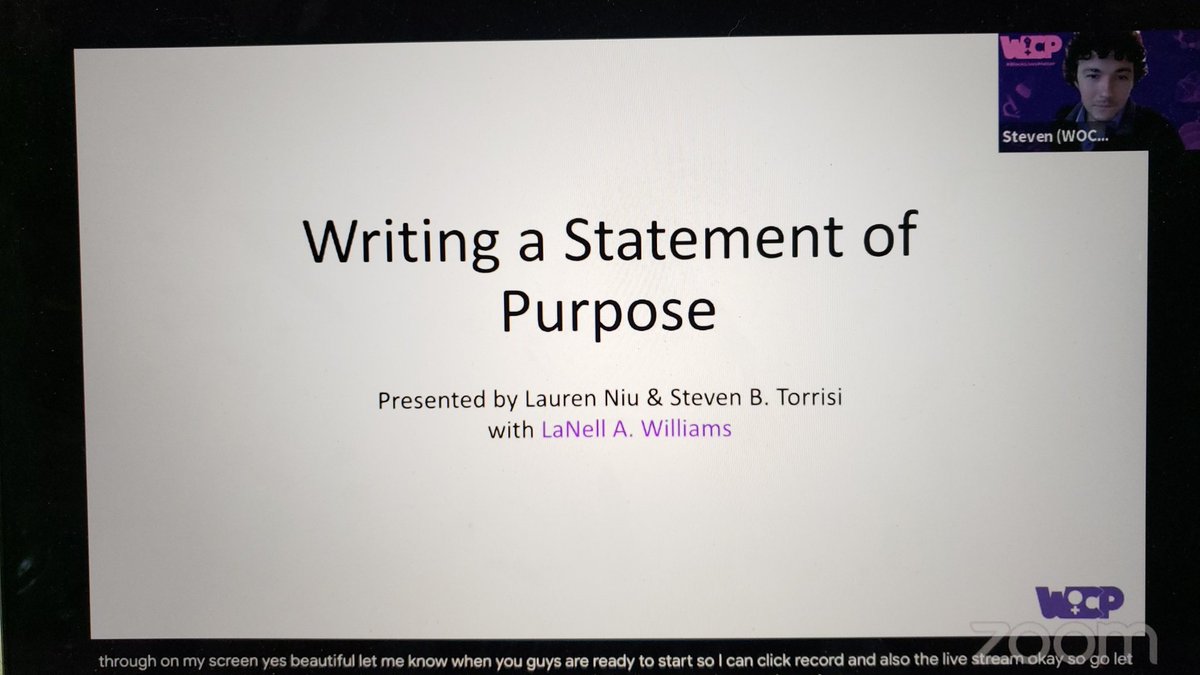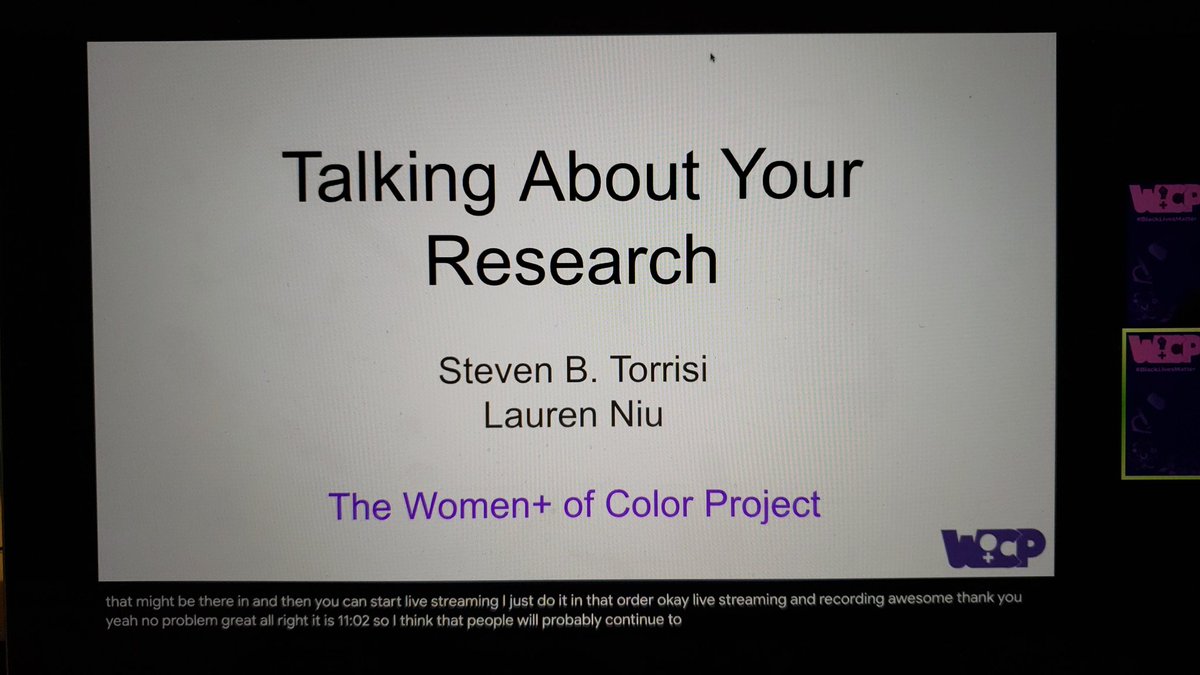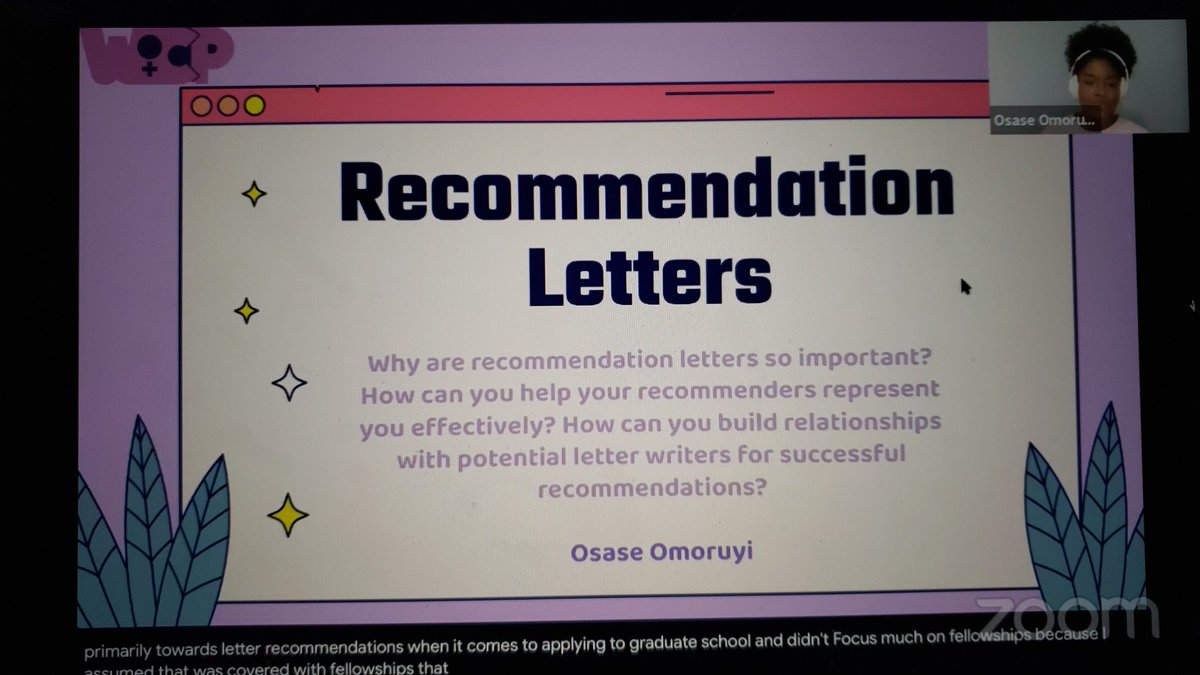
Now Lauren Niu, Steven B. Torrisi and @AlxndriaTH3Gr8 will talk about writing a statement of purpose! #wocp #thewocproject2020 #graduateschool #womeninstem 

What is a statement of purpose (SOP)?? The SOP for graduate school is a more specialized and focused document, it is NOT like the college essay! It is a statement of:
-Research experience
-research interests
-how you fit into the program
#research #gradschool #sop #womeninstem
-Research experience
-research interests
-how you fit into the program
#research #gradschool #sop #womeninstem
Big thing to keep in mind is who your audience is and you have an advantage bc you know who they are, they are profs, researchers at universities!
#gradschool
#gradschool
What should I think about when writing??
-Focus on your research!
-craft a story that connects the dots (How did these research experiences shape you?)
-decide on why a particular institution is a good fit! (fit and match are key to admissions!)
#gradschool #wocproject
-Focus on your research!
-craft a story that connects the dots (How did these research experiences shape you?)
-decide on why a particular institution is a good fit! (fit and match are key to admissions!)
#gradschool #wocproject
What personal details should I include?
-Deploy your non-scientific personal experience as a part of the argument
-Details should ultimately tie your interests to grad school
-Deploy your non-scientific personal experience as a part of the argument
-Details should ultimately tie your interests to grad school
Ingredients of a successful SOP:
-Succint explanation of why do you want to go to grad school
-full accounting of your research background
-highlights of your other science - related accomplishments (being a TA, outreach)
-1 paragraph max about personal circumstances
-Succint explanation of why do you want to go to grad school
-full accounting of your research background
-highlights of your other science - related accomplishments (being a TA, outreach)
-1 paragraph max about personal circumstances
Ingredients of a successful SOP:
-Half to one paragraph : tailoring to individual university depts.
-Address and include the info asked by the prompt! (Read the prompt!)
-Half to one paragraph : tailoring to individual university depts.
-Address and include the info asked by the prompt! (Read the prompt!)
Ingredients of SOP (and length):
-why you want to go grad school (1 paragraph)
-research experience (3-5 paragraphs total)
-other science-related accomplishments (1 paragraph)
-personal explanation (1 paragraph)
-tailoring (half to 1 paragraph)
-why you want to go grad school (1 paragraph)
-research experience (3-5 paragraphs total)
-other science-related accomplishments (1 paragraph)
-personal explanation (1 paragraph)
-tailoring (half to 1 paragraph)
Further Tips and Tricks!
Style: Formatting
-Break up your essay into well-formatted paragraphs
-organize your essay rhetorically (if you make a statement, immediately follow up with supporting details)
-use (tasteful) text stylizing to help guide your reader's eye
Style: Formatting
-Break up your essay into well-formatted paragraphs
-organize your essay rhetorically (if you make a statement, immediately follow up with supporting details)
-use (tasteful) text stylizing to help guide your reader's eye
Dealing with Red Flags:
-Never avoid speaking about 'red flags' (GPA, GRE, missing semesters)
-Find a way to address them briefly and frankly, and show how you've overcome those obstacles.
-'Prime' the reader: your chance to help the reader see you in a positive light!
-Never avoid speaking about 'red flags' (GPA, GRE, missing semesters)
-Find a way to address them briefly and frankly, and show how you've overcome those obstacles.
-'Prime' the reader: your chance to help the reader see you in a positive light!
What NOT to do:
-Not addressing the prompt!
-Spelling errors, bad grammars, etc. (read it backwards! Have a friend proof read!)
-Informal language (no need for jargon!)
-essays that sound like they were written generically
-too-flowery writing. Be kind to your reader!
-Not addressing the prompt!
-Spelling errors, bad grammars, etc. (read it backwards! Have a friend proof read!)
-Informal language (no need for jargon!)
-essays that sound like they were written generically
-too-flowery writing. Be kind to your reader!
What NOT to Do:
-How 'proud' you would be if admitted
-'Since I was five, I've always wanted to be a...' (talk about your contact with science closer to now!)
-lengthy restatement of textbook facts (talk about how you contributed to the discipline)
-How 'proud' you would be if admitted
-'Since I was five, I've always wanted to be a...' (talk about your contact with science closer to now!)
-lengthy restatement of textbook facts (talk about how you contributed to the discipline)
What NOT to do:
-Not addressing 'red flags'
-strategically lying about your research interests
-generally: lying of any kind
-Not addressing 'red flags'
-strategically lying about your research interests
-generally: lying of any kind
How do you revise and get feedback?
- DON'T BE SHY! Ask your professors for feedback if possible.
-Ask us, the WOC Project!
-Imagine that you are advocating for a friend when advocating for yourself!
-Keep your reader in mind! What do you want to take away from your essay?
- DON'T BE SHY! Ask your professors for feedback if possible.
-Ask us, the WOC Project!
-Imagine that you are advocating for a friend when advocating for yourself!
-Keep your reader in mind! What do you want to take away from your essay?
• • •
Missing some Tweet in this thread? You can try to
force a refresh





